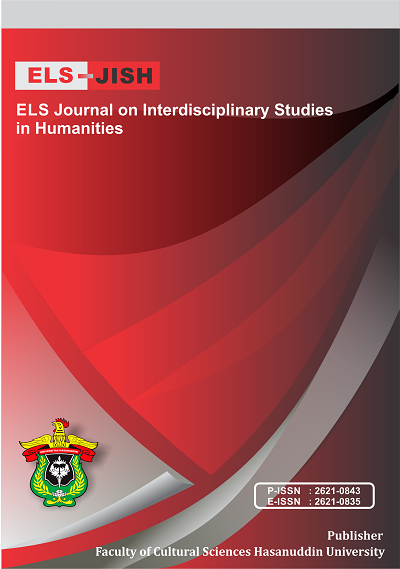English Linguistics Terms Based on Android Application (Terminoghraphy for English and Literature Students)
DOI:
https://doi.org/10.34050/elsjish.v6i1.26262Keywords:
Android Application, English Linguistics, Literature Students, TerminoghraphyAbstract
This research discussed about Applied Linguistics in Termontography theory by Temmerman (2013). This research discussed about Applied Linguistics in Termontography theory by Temmerman 2013. This objective of the research are 1) to find out English and Literature students’ challenges in learning linguistics terminologies, and 2) to reveal the effectiveness of ELITE (English Linguistics Terminology), an Android application developed by the researcher, in addressing English and Literature students’ needs in learning linguistics terminologies at the English and Literature Department. The theory divided into five principles in making a specialized dictionary, in this case is Linguistics terminology. This research used corpus collection instrument by collecting data from several references. The finding showed that the Linguistics application was build based on the five principles of Termontography; (1) Monolingual, it uses English language as the user target for English literature students; (2) Structure Consecutively, there are 711 corpus collection words in linguistics terminology, they are set consecutively from A to Z initials; (3) Standard Description, corpus collection based on the Linguistics dictionary book of Cambridge university press 2013; (4) One design, the application provides a term and its definition; (5) Permanently; each term and its definition as well as the application are permanent used for Android user. Based on the result, the application could prove the theory of Temmerman about Terminography in its five principles, and it can be implemented to English Literature students.Downloads
References
Amir P.,M., Sukmawati, Rahman, F.F., & Andini, C. (2023). Symbolic Violence and Woman’s Resistance Reflected in “Legally Blonde” Novel by Amanda Brown. Journal of Positive Psychology & Wellbeing, 7(2), 556–564.
Andini, C., Sosrohadi, S., Fairuz, F., Dalyan, M., Rahman, F. F., & Hasnia, H. (2022). The Study of Japanese Women in the Facial Treatment Advertisement: A Semiotics Perspective of Pierce’s Theory. ELS Journal on Interdisciplinary Studies in Humanities, 5(2), 337-347.
Azimi, H. M. (2014). E-Learning Needs Assessment among Students in the Colleges of Education. Malaysian Online Journal of Educational Technology, 2(1), 11-22.
Boellstorff, T., Mahardika, A., Pratiwi, T., Soraya, A., & Widaningrum, W. (2013). Landscaping mobile social media and payments in Indonesia. Institute for Money, Technology, & Financial Inclusion: Irvine, CA, USA.
Brooke, J. (2013). SUS: a retrospective. Journal of usability studies, 8(2), 29-40.
Farrell, S., & Nielsen, J. (2013). User Experience Careers: How to Become a UX Pro, and How to Hire One. Nielsen Norman Group.
Finch, G., & Finch, G. (2003). The Linguistic Context. How to Study Linguistics: A Guide to Understanding Language, 12-45. Springer
Omer, M. A., Zeebaree, S. R., Sadeeq, M. A., Salim, B. W., Rashid, Z. N., & Haji, L. M. (2021). Efficiency of malware detection in android system: A survey. Asian Journal of Research in Computer Science, 7(4), 59-69.
Prihandoko, L. A., Tembang, Y., Marpaung, D. N., & Rahman, F. (2019, October). English language competence for tourism sector in supporting socio-economic development in Merauke: A Survey Study. In IOP Conference Series: Earth and Environmental Science (Vol. 343, No. 1, p. 012170). IOP Publishing.
Rahman, F. (2018). The Constraints of Foreign Learners in Reading English Literary Works: A Case Study at Hasanuddin University. Journal of Arts and Humanities, 7(2), 01-12.
Rahman, F., & Amir, P. (2019). Trends in Reading Literary Fiction in Print and Cyber Media by Undergraduate Students of Hasanuddin University. International Journal of Education and Practice, 7(2), 66-77.
Rahman, F., Sutanto, T. E., & Fitriyati, N. (2021). Web Traffic Anomaly Detection using Stacked Long Short-Term Memory. InPrime: Indonesian Journal of Pure and Applied Mathematics, 3(2), 112-121.
Richey, R,C. Klein, J,D. (2013). Design and Development Research. Handbook of Research on Educational Communications and Technology. Springer Science Business Media, pp. 141-150: New York.
Statista Inc. (2018). Market share held by mobile operating systems in Indonesia from January 2009 to July 2018. New York, N Y, United State U.S: McKay, P, 262205. Retrieved from https://www.statista.com.
Sugiyono, (2017). Metode Penelitian dan Pengembangan (Research and Developmen/R&D). Bandung, Indonesia: Alfabeta publisher.
Temmerman, R. (2007). Approaches to terminology. Now that the dust has settle. SYNAPS, (2), 28-36.
Weda, S., Atmowardoyo, H., Rahman, F., & Sakti, A. E. F. (2021). Linguistic aspects in intercultural communication (IC) practices at a higher education institution in Indonesia. Eroupean Language Scientific Journal, 14, 2-6.
Downloads
Published
How to Cite
Issue
Section
License
Copyright (c) 2023 Hasrullah

This work is licensed under a Creative Commons Attribution-ShareAlike 4.0 International License.

















